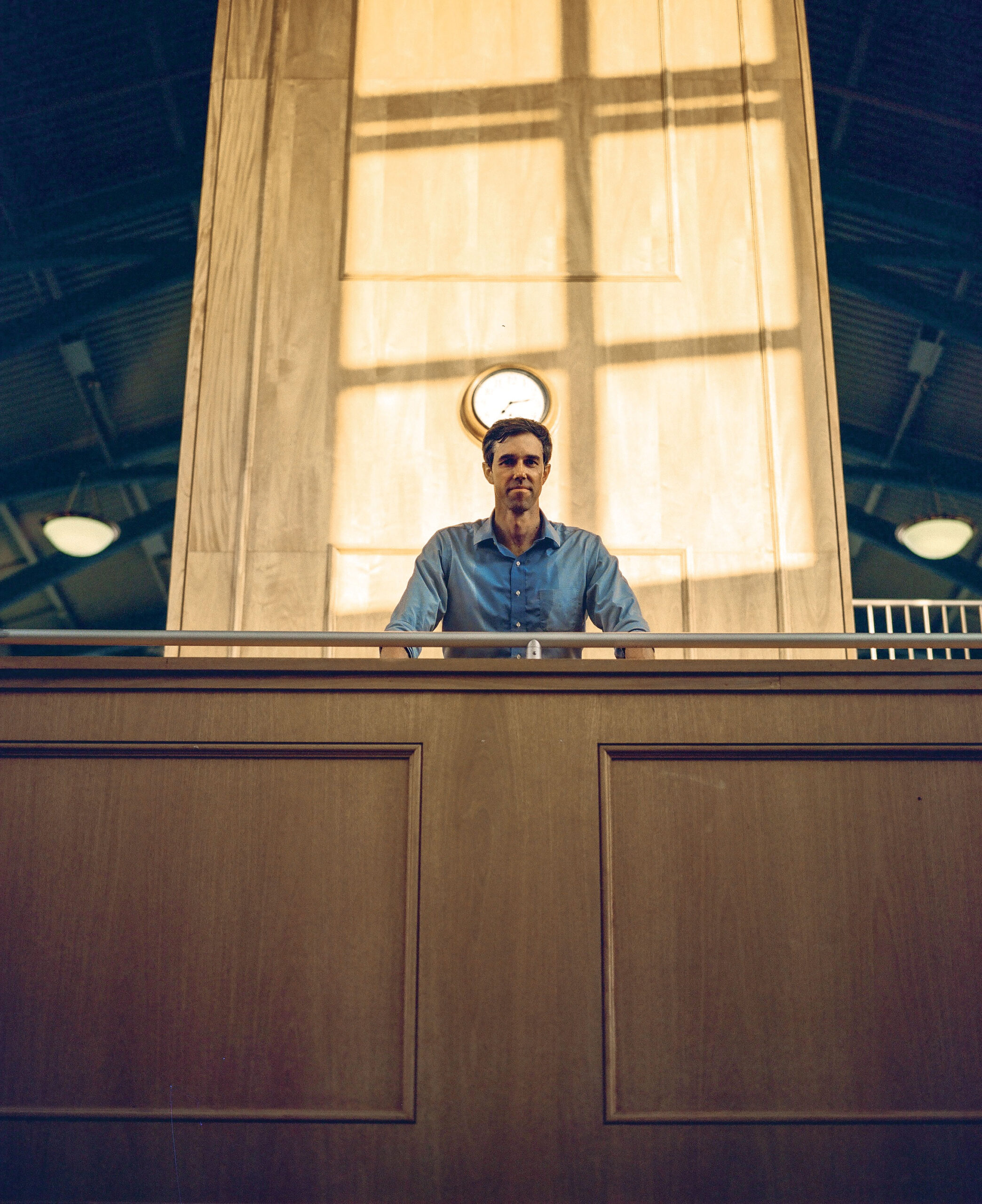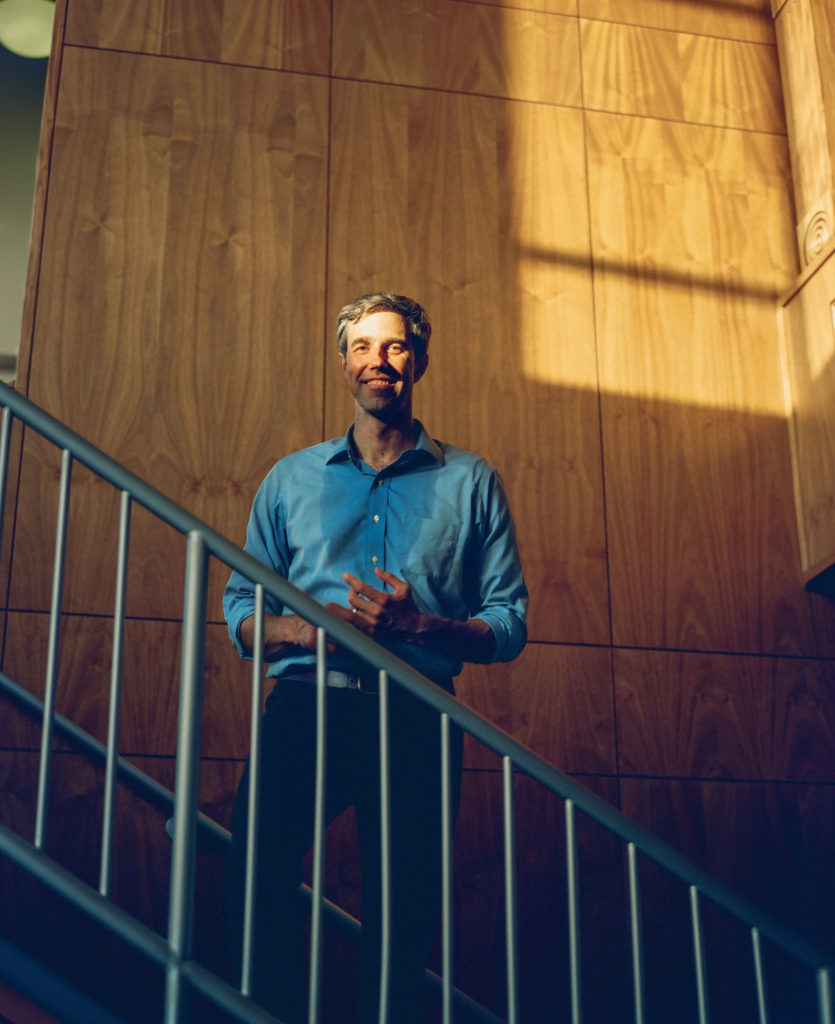Following Beto — an Afternoon at an Inner-City Houston School With the Man Who Wants to Change Texas Politics: O’Rourke Talks of Growing Up in a Border Town, Swears He Doesn’t See Red and Blue
BY Catherine D. Anspon // 10.29.18Beto O’Rourke strikes a pose during a whirlwind Houston visit.
A U.S. Senatorial candidate from Texas has become a phenomenon in the political landscape, taking on a lightning-rod opponent — former presidential candidate and incumbent Texas Senator Ted Cruz — in one of the most intensely watched congressional races of the mid-term elections. Could this boyish man from El Paso be the future of Texas? Of America?
We had six minutes and 25 seconds to find out, which Beto O’Rourke’s handlers carved out of his back-breaking schedule, during an appearance at an inner-city public high school.
One Monday afternoon in late summer — after a volley of emails with Beto O’Rourke’s media handlers — our team found itself at an O’Rourke town hall at fine-arts magnet Westbury High School in Houston. A tight 20 minutes for our Q&A and portrait sitting had been negotiated for our story, then reduced to a mere 10 minutes that day.
Westbury High School stood out like a beacon, its gleaming new wing the site of the O’Rourke town hall and a PaperCity interview. A flurry of cars arrived. Supporters, some with signage and patriotically dressed, rushed inside. I checked my watch. Forty-five minutes to go.
The Westbury marching band, crisply uniformed and lined up along the sidewalk at attention, created a sense of ceremony, awaiting the arrival of the candidate. Inside, volunteers manned sign-up sheets, dispensed buttons and yard signs, and directed the crowd to the school’s newly opened cafeteria.
First order was to find the press officer in charge, who confirmed — no surprise — that O’Rourke would be slightly late, but was en route. The press team led us down a hallway to a teacher’s office, a quiet spot for our interview. We staked out a place to take the photos, then waited. Fifteen minutes passed in the classroom, then it was clear O’Rourke was in the house.
The crowd noise was overwhelming. We hurried to the entrance in time to see the senatorial hopeful disappear into the cafeteria, where he greeted a crowd of nearly 2,000, aligned in chairs and into overflow bleacher-style seating. I squeezed into a space, not wanting to miss the town hall.
O’Rourke’s on-site director assured us we would get our portrait and 10 minutes, but we had to be prepared to take advantage of the tight window of time after the town hall and before his meet-and-greet.
Beto Mania
Robert Francis “Beto” O’Rourke has captured the attention of pundits, press, and the people for disrupting the status quo. The telegenic candidate, a three-term Democratic Congressman from El Paso, is adamant about not accepting any money from political-action committees.
Still, the fund-raising for his U.S. Senatorial campaign has shattered records: In the second quarter, the campaign hauled in $10.4 million, secured mostly from individual voters (via modest amounts averaging $33 per donor).
Red versus blue labels are sharply ignored. Pollsters aren’t hired. And O’Rourke has taken his message directly to every county in Texas — 254 in number, via town halls and less formal meet-and-greets. He fearlessly goes deep into red rural counties, in places where the populace has never laid eyes upon a senatorial candidate from either party in its lifetime.
As midterms approach, during a time that everyone can agree is intensely contentious, it’s no longer business as usual in the quest for one of the most influential posts in American government. By way of O’Rourke, the country has seen a new definition of a campaign — one where the candidate is candid, unscripted (in disarming Facebook Live posts from his 34-day Texas-wide road trip), and thoughtfully outspoken.
When asked during another recent veteran-filled town hall in Houston about his stance on NFL players’ right to take a knee during the National Anthem, O’Rourke’s of-the-moment response went viral. He linked the gesture to peaceful protest, with references to Martin Luther King, Rosa Parks, Selma, Alabama and the Freedom Riders. To date, 44 million people have watched his response on YouTube. One might not concur with his view, but it was not pat political rhetoric.
O’Rourke has been compared to a Kennedy, drawing rapturous crowds and securing A-list appearances — from Ellen DeGeneres, Town & Country, Bill Maher, Stephen Colbert, and U.K.-based daily The Guardian. Not bad for an underdog on the political map, whose credentials include Columbia grad; web development company founder; father of three; and son of a furniture store owner and a county judge.
He was living a relatively low-profile life in El Paso until his successful run for Congress in 2012.
As example of his newfound celebrity, fellow Congressman and friend Joe Kennedy III — for whom O’Rourke has been mistaken — traveled to Texas this spring, where he was spotted driving O’Rourke around on whistle stops (a scene captured on the candidate’s Facebook feed). The duo even bantered about their both being on the ticket come 2020.
I stood in the back and craned to see the man of the hour. O’Rourke’s voice carried forcefully. My sight lines were blocked, but the tall, slim man darting back and forth at the front of the room made an impact. He spoke without notes, relaying stories in paragraphs instead of sound bites about the concerns of those he had met and witnessed. A story of a recent visit to the HISD STEM magnet Kashmere High School — a place of resiliency in a neighborhood slow to recover from Hurricane Harvey — resonated with the crowd.
Our team got the go-ahead signal. We threaded our way through the crowd, out a door into the courtyard that led into another wing. All the while, O’Rourke took audience questions. More waiting.
Teacher Al Campbell, a well-known jazz musician who performs gigs around town and who directs the jazz band program at Westbury, shared his impressions of the day. Campbell told us O’Rourke’s appearance reminded him of another day, when he was a teenager and Bobby Kennedy spoke to his high school in Memphis.
Then in came O’Rourke. We were informed that our time with him — including photo shoot — was now less than 10 minutes. We elected to do the portrait first. O’Rourke’s Oxford shirt, worn loosely opened around the collar, was drenched in sweat. Introductions were made.
He warmly greeted our team and asked about the focus of the story. He was surprisingly real — and not “on.” Charismatic, and down-to-earth, his focus was on those in front of him.
Coming down from the euphoria of addressing nearly 2,000 to conversing with our group of three, he was just as present and affable, asking our photographer, who wore a Pixies T-shirt, his favorite song by the band. Our art director led the candidate to indoor steps below a courthouse-style clock, as the final rays of early evening light radiated over his head.
It was the shortest PaperCity photo shoot on record: four minutes. Six minutes left for the interview.
We laid the groundwork for our conversation, before leading into more personal questions — how he keeps up with this grueling pace; life on the trail in a Toyota Tundra truck; the part his family plays; what keeps him going; and the similarities between political campaigning and touring in a punk rock band, as he once did.
Six minutes into our chat, there was a firm cutoff signal from his staff. Nearly 2,000 people were lined up in the cafeteria, waiting for O’Rourke and their moment to shake his hand, pose with him for a Facebook or Instagram picture, and tell him their thoughts and concerns.
What follows may not be the comprehensive, in-depth interview with Beto O’Rourke that we dreamed of, but that day became a story nonetheless.
One afternoon in a Houston high school proved that democracy is alive and well. Its vibrancy emanates from Texas, by way of a man who is civil, intelligent, likable, real, and committed.
As for the question of the red and the blue, in O’Rourke’s eyes, those are merely the colors of our country’s flag.

In the beginning.
“My wife Amy and I began to talk about [running for Senate] after the November 2016 election. It became clear to us very quickly that everything we cared about for the country — everything we had told our kids what this country stood for and stands for — is on the line. And we had better do our best.”
And it grew from there.
“The idea was to go as big and bold as we possibly could. It became clear at that moment that the biggest, boldest, and maybe craziest thing we could dowould be to run for the United States Senate. And so, not too soon thereafter, I began to travel the state and listen to folks and found that many people had come to the same conclusion:
“We’re at a real turning point in this country, and it’s going to be either walls or Muslim bans or ‘Press is the enemy of the people’ — smallness, paranoia, hatred, and racism — or it’s going to be ambition and aspiration and greatness, and I want to be there for greatness. And that’s kind of the conversation in a nutshell.”
Some felt despondent in November 2016.
“Oh, yeah, I did. I was depressed; we were distraught. I was a member of Congress, and I thought, ‘I just need to try harder in what we’re doing right now.’ Amy then said, ‘We’re going to have to answer to our kids about what we did.’ And I’ve got to tell you, after doing this for a year and a half, this is as much as we can do. We are going all out, as hard as we can.”
Your father [late county judge Pat O’Rourke] is an inspiration.
“My dad’s always part of my thinking. He’s part of my consciousness and what I have found in my life. And that may be true for others who have lost their parents — they’re with you every day thereafter. They shaped you; they’re part of your mannerisms, your character.
“But they’ve also helped. They’ve hardwired to some degree your dreams for you, and my dad always said, ‘If you’re going to do it, you’re going to do it to the best of your abilities. And if you’re getting out there, you better go win.’ And you should also have fun while you’re doing it.
“There should be some joy involved in what we do in life.”
Faces of the campaign trail.
“There are so many. There are heartbreaking stories, some of which I related in there [today]: the 29-year-old young man who’s going to die of diabetes if we don’t find a way to get health care.
“We met with some of the victims and parents of victims of the Santa Fe shooting, not too far from here. Their stories are powerful, but their ability to overcome tragedy or obstacles is inspiring. You think, ‘We’ve got to be there for them given everything that they have done.’
“Veterans we’ve met who’ve served as far back as World War II come out to our meetings, introduce themselves, tell us their stories. People have been extraordinarily kind, they’ve made us food, taken us into their homes — [people who] come out to the town halls in Childress or Muleshoe or Edna or Alice. All of those have been really powerful experiences.”
You’re from a border town – what is misunderstood about immigration.
“You know, some of this is our fault, some of us that live on the border. We’ve allowed others to define us, and the fear and the anxiety and the paranoia that’s expressed in the wall, or militarizing the border, or tearing kids away from their parents after they’ve survived a 2,000-mile journey. That’s all an expression of our worst fears and impulses, and in no way reflects the reality of life on the border.
“El Paso is one of the safest cities — if not the safest — in America. Our safety is in part dependent on the fact that we’re a city of immigrants, and people come here to get ahead, not to commit crimes. They come here to make this country even greater, not to drag it down. Instead of being defensive about that, or apologizing for ourselves, we should own it, and capitalize on it — and lead nationally on an issue that we know better than anyone else.
“And when I say ‘the border,’ I’m thinking about El Paso, but I’m also thinking about Houston. This is the international city. This is the most diverse city in the country. There are 145 languages spoken in the public schools in Houston, Texas. I didn’t even know there were 145 languages spoken on the planet. This is a competitive advantage, and we have to press that advantage.”
Your message to immigrants.
“You’ve been working in the toughest jobs, in the shadows, maybe not even making minimum wage, contributing far more than you ever take. What if you could contribute fully to civic, economic, and democratic life? You’re a dreamer teaching in school, serving in Syria, being every bit as American as anyone else. What if your citizenship status reflected that?
“Those are all aspirational, positive, good things — we don’t have to be against anyone to do that.”






























_md.jpeg)

_md.jpeg)


_md.jpeg)

_md.jpeg)

